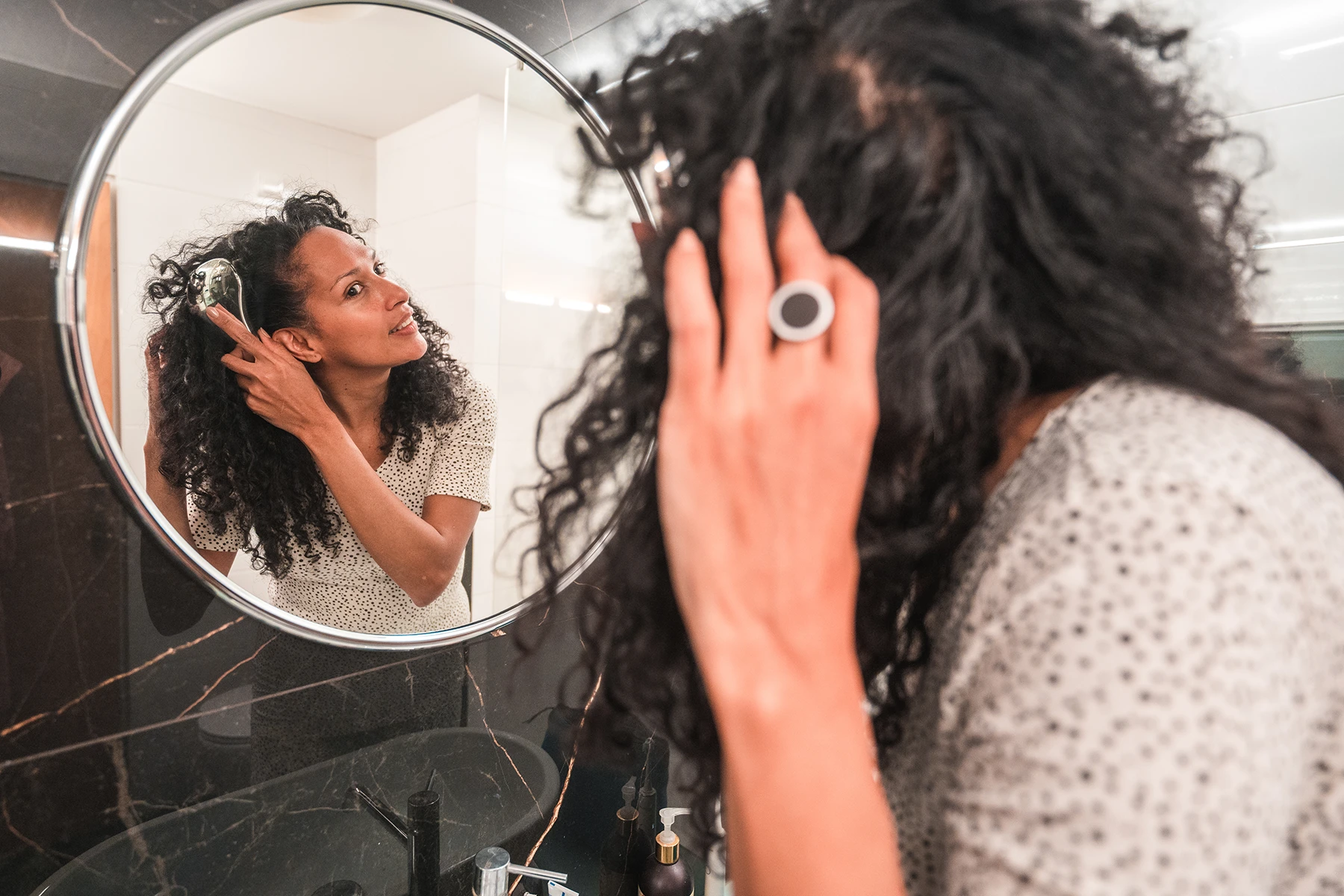Hair Loss and Menopause: What Dermatologists Want You to Know

If approaching menopause has you pulling out more strands of hair in the shower than usual, you’re in good company. Celebrities like Viola Davis, Jada Pinkett Smith and Alyssa Milano have all bravely shared the truth about hair loss from alopecia, aging, hormones and even COVID-19.
While hair loss can be a normal part of aging, it can also be directly related to the hormonal changes that occur during menopause. Of all the changes that come with perimenopause and menopause, hair loss can feel like losing a sense of self.
The good news is you don’t have to accept your hair loss. Antonella Tosti, M.D., a dermatologist with the University of Miami Health System, is among the world’s leading experts in hair disorders. She shares what you need to know about hair loss and how to find a solution that works for you.
What causes hair loss during menopause?
Around age 40, women can experience age-related hair loss due to the narrowing of the hair fibers, says Dr. Tosti. This is normal, as long as hair thinning happens all over the scalp.
Some women can experience female pattern hair loss (FPHL), also known as androgenetic alopecia, where areas of the scalp become visibly thin. This occurs from a decrease in estrogen and an increase in androgens — hormones that are affected in menopause.
Is it menopause or something else? How hair loss is diagnosed
FPHL — hair loss due to hormone changes — is the most common type of hair loss disorder. Another common type during menopause is called frontal fibrosing alopecia, which causes the hairline to gradually recede.
It’s important to get a correct diagnosis in order to get the right treatment, says Dr. Tosti. There is no accurate blood test to diagnose hair loss caused by menopause.
Instead, a technique Dr. Tosti pioneered, called trichoscopy, can be used to examine the scalp and determine if your hair is thinning. “This is even better than a scalp biopsy as it allows your doctor to check all your scalp and not only a 4 mm spot,” she says.
Trichoscopy can help diagnose hair loss caused by hormonal changes. Today, dermatologists worldwide use the non-invasive technique to diagnose hair loss.
Treatment options that actually work
There isn’t a cure for hair loss. Instead, consistency and long-term commitment are key. One of the most common medications for hair loss is topical minoxidil, otherwise known as Rogaine. Oral medications, like oral minoxidil, spironolactone and finasteride, can help with hair loss due to hormone imbalances. They should only be used under medical supervision.
What’s New: PRP and Laser Therapies
Some newer treatments that address hair loss include platelet-rich plasma (PRP) injections and laser therapy.
PRP uses your body’s own blood cells to stimulate the regeneration of new hair growth and prevent new hair loss. Laser therapy uses low-dose laser treatments to stimulate hair follicles to grow. The latest laser FoLix, made by Lumenis, was recently approved by the U.S. Food and Drug Administration (FDA) for hair loss treatment.
Both PRP and laser therapy are most effective when used in combination with medical treatment, says Dr. Tosti.
Hair loss FAQ
Hormone Replacement Therapy: Helpful or Harmful?
Some research suggests that hormone replacement therapy (HRT) can help prevent hair loss. However, Dr. Tosti notes that some components of HRT, such as progestin, can actually accelerate hair loss in women. She advises women to work in coordination with their dermatologist and hormone specialist.
Are online prescription platforms for hair loss treatments safe?
The short answer is yes, according to Dr. Tosti. If you have an accurate diagnosis, you can buy medications for hair loss online. “Hair diseases are sometimes difficult to diagnose, so it’s wise to see a doctor first,” says Dr. Tosti.
What about supplements?
Being deficient in some vitamins and minerals can contribute to hair loss. Supplements that can be beneficial for hair health include biotin, vitamin D and iron. These should be used in combination with other medical treatments to be effective. It’s also important to do blood work to check your lab values before starting.
How can I prevent hair loss?
Gentle hair care can prevent further damage. Avoid tight ponytails and styling tools with excessive heat, which can weaken your hair. Use shampoos and conditioners without harsh ingredients. Keratin treatments are marketed for reducing frizz and adding smoothness, but they can lead to significant shedding and contain harmful chemicals like formaldehyde.
Hair loss can be managed
While hair loss related to menopause is common and has no cure, it can be managed. Getting an accurate diagnosis is the first step to a solid treatment plan. “The main way to mitigate the emotional impact of hair loss is to reduce hair loss and improve the hair density and volume when possible. Combining the most effective treatment after a correct diagnosis is the key,” says Dr. Tosti.
Click here to schedule an appointment with a dermatologist at UHealth.
Written by Wendy Margolin for UHealth.
Tags: Dermatology insights on hair loss, Dr. Antonella Tosti, Hormonal hair thinning, Managing menopause symptoms, why am i losing hair
